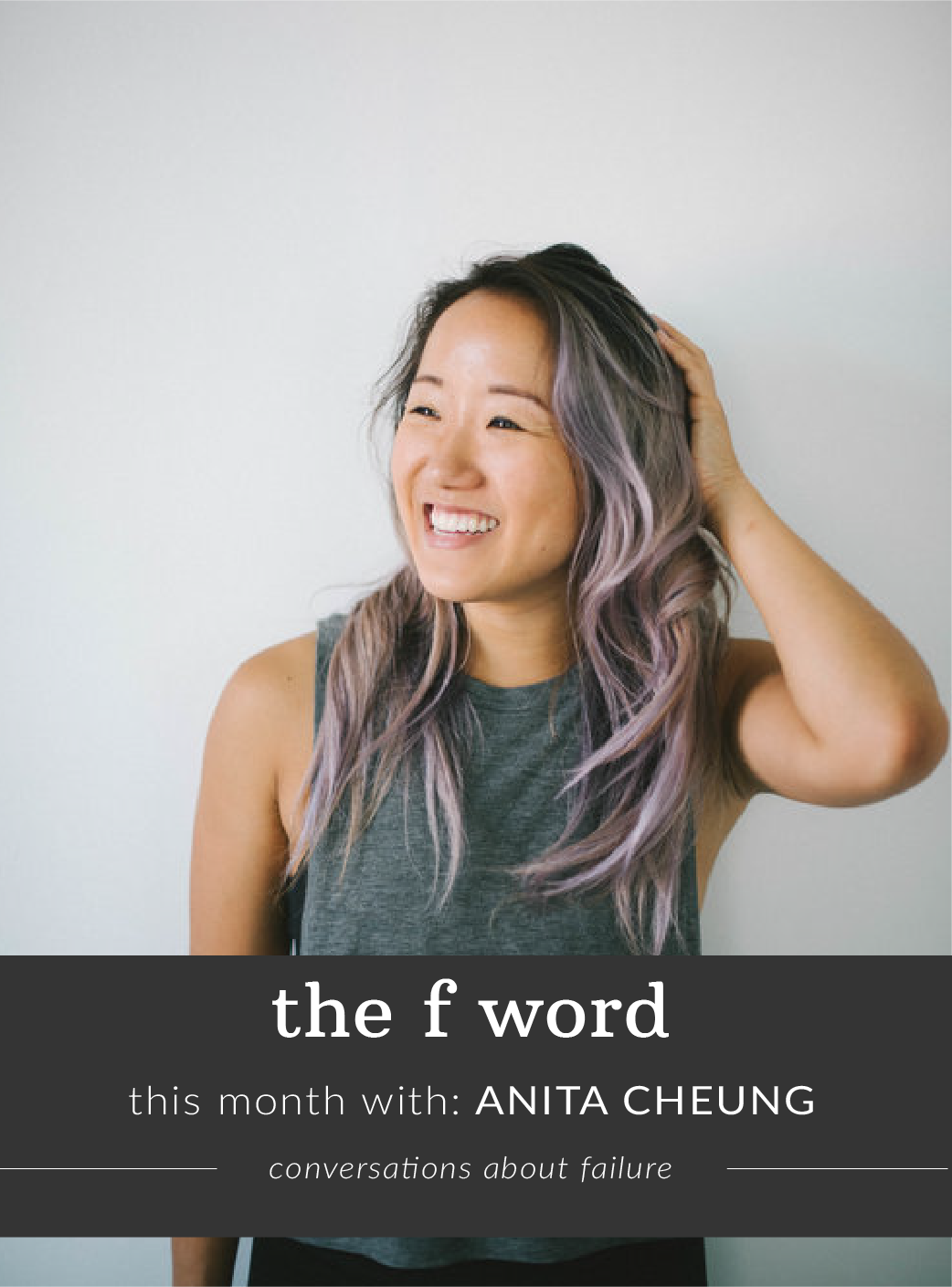The F-Word: Anita Cheung
Editor’s Note: While Social Yoga and Moment Meditation has closed down, Anita has founded Create With Neets, a creative agency that focuses on branding, web design and art direction.
Meet Anita Cheung, founder of Social Yoga and co-founder of Moment Meditation, Vancouver’s first dedicated meditation studio. As an entrepreneur who’s built her career on businesses centred around yoga and meditation, it might surprise you to discover that Anita’s journey to accepting yoga and meditation into her life was anything but a straight line. She’d originally written off yoga as “too slow”, determining that it didn’t belong in her fast-paced lifestyle. It wasn’t until hitting some, in her own words, “serious life lows” that she found a sense of calm in the practice.
And that’s what we love about Anita–she’s open and honest about her journey into becoming a serial entrepreneur. She’s willing to share the wonderful highs as well as the gritty, difficult lows. And so without further ado, here’s my conversation with Anita.
Let’s start by defining it. To you, what do you feel like failure is?
At our meditation studio a few weeks back, we had a ‘Meditation on Failure’ event. And from that, there was one quote that really resonated with me and it has kind of taken permanent residence in my brain. It’s this -- ‘Perhaps we don’t ever really fail, and our perception of failure is simply our resistance to what is unfolding.’ I’m very strong-willed and stubborn so I have this image of how I want things to turn out and when it doesn’t, then that feels like failure.
GROWING UP, HOW DID FAILURE FEEL TO YOU?
As a kid I was very hard on myself, and I think it comes from having immigrant parents and being a people pleaser. The concept of failure used to be much more black and white for me.
AND HOW DO YOU THINK YOU LEARNED WHAT FAILURE WAS GROWING UP?
I think it's similar to many kids. It was ‘What makes my parents happy?’ and ‘What makes my parents sad?’
And I think that became correlated with my emotions too, after a certain point. Like it was about letting other people down versus now it's more internalized, recognizing I set my own expectations.
HOW DO YOU FEEL LIKE THE FEAR OF FAILURE IMPACTS YOUR DAY TO DAY NOW?
To be totally honest, the fear of failure, it's not a fear that I live with day to day. I am really confident in my own ability. I think that comes from being through the lifetime I’ve have had so far, of setting goals and achieving them, setting goals achieving them. It has built this confidence in myself that if there is something I really want to do, I can do it and I will do it.
Which is both a good thing and a bad thing. It's a good thing in that it doesn’t stop me from trying something, but it does mean that when I do fail it hurts so much more and I fall so much harder because I haven't had the chance to practice it. Definitely stings a lot more.
HOW DID YOU BUILD UP THIS RESILIENCY OF TAKING THE RISKS AND TRYING THINGS OUT THAT LED YOU TO YOUR CURRENT STATE, WHERE YOU’RE PRETTY COMFORTABLE TAKING THESE RISKS?
It's definitely not something I’ve always had. It's something I continue to build on. Everytime I set my mind to something and do it, I think ‘Okay, one more in the bank.’ And then for every time where there is a failure, then it's almost a withdrawal from this metaphorical Bank of Confidence. However the nice thing I try to keep in mind is that failure often doesn’t stick around, it’s not as sticky as success. We remember the good things for the most part stronger long term than the bad.
WHAT ADVICE WOULD YOU GIVE TO PEOPLE WHO FEEL LIKE THEY HAVEN’T BUILT UP ENOUGH OF THEIR ‘CONFIDENCE PIGGY BANK’ TO CASH IT IN YET?
Two main things. One is surrounding yourself with people who are interested in supporting you, people who are interested in seeing you at your best. No time for haters. I mean people can provide critical feedback but I find, depending on the industry, a lot of creatives, a lot of entrepreneurs, we are our own worst critic. So it’s important to figure out what you need and then build your support system around that. Like I know for me I am definitely my own worst critic so I need people who tell me I’m amazing and awesome, because I often forget that. Knowing your mindset is super important in finding your support system.
And the second thing? Just go for it. Sometimes we get inhibited by the daunting idea of starting something and if you just try it and go for it, the higher the chance you will succeed.
HOW DO DOES FAILURE (AND FEAR OF FAILURE) FEEL DIFFERENT, COMPARING YOUR EXPERIENCES NOW HAVING BUSINESS PARTNERS WITH MOMENT MEDITATION AFTER YOUR HISTORY AS A SOLOPRENEUR CREATING AND RUNNING SOCIAL YOGA?
I always compare business partnerships to marriages. I feel like me and the partners at Moment went on a blind date and then got married. That means we’re still learning about each other and how to navigate communication with each other, and in the process I’m learning about myself too. Do I prefer working alone? Or with people? So it's super interesting.
At first I thought it would be like driving automatic vs. driving manual, but it’s more like driving a car vs. flying a plane. Being a solo entrepreneur vs. going into business with partners are totally different beasts.
Navigating success and failure when you’re in a team setting, failure starts to trigger that childhood feeling of I’ve failed and disappointed myself but even more so that I’ve also disappointed someone else. When there are other people at stake, there is more shame around it, more guilt. But at the same time when there is success, there is usually greater success and it feels a lot better too.
WHY DO YOU THINK WE HAVE SUCH A HARD TIME TALKING ABOUT FAILURE AND SOMETIMES ADMITTING WE HAVE FAILED WITH SOMETHING?
I definitely think it’s shame. Shame is one of the most damaging and powerful human emotions, and the fear of feeling ashamed, shameful, shamed, is pretty big.
AND WHY IS THAT? WHAT IS THE FEAR THAT SHAME BRINGS UP FOR US?
I mean I can only hypothesize and speak from my own experience. But I feel like shame brings forth feelings of unworthiness, almost, which in the grand scheme of things–we’re getting super deep now–the feeling of failure and shame, it makes us feel unworthy, that’s the best word I can use to describe it.
It’s very isolating. We don’t hear enough stories about other people failing, so it's not like failure is something we can connect over. So when we fail, it feels like we are the only one.
DO YOU FEEL LIKE SOCIAL MEDIA IMPACTS THIS?
I definitely think it does, because we only see the highlight reel, although there are a few people out there striving to break that mold.
ARE THERE ANY PARTICULAR PEOPLE THAT COME TO MIND WHO YOU ADMIRE FOR BEING TRANSPARENT?
Paulina Cameron comes to mind, who works for Futurpreneur. I remember one time she posted a video of herself after a complete meltdown. She was teary and blotchy–you know, how your face looks after you cry–but still completely adorable. She was basically saying ‘This is me after trying to do a million things at work and be a good mother.’ I remember she was really open about that struggle.
Ji-Youn, she runs The Tipping Point, a very big advocate of mental health, she is very real on social media.
And Kayley Reed from Wear your Label. She’s super open about when she feels anxious to create content and the pressure that comes with that.
These are three women I can think about off the top of my head and I only hope that I can be that brave. I think it was Kayley that said one time, ‘We can’t blame the media anymore because we are the media.’ And I loved that. Each and every person has responsibility. If we don’t like what we see, we can co-create and recreate media that is more responsible and more reflective of the actual population. It’s a good reminder to show it all and not just the highlight reel.
That’s it for 2018! Join us in January when we sit down with Chloe Popove, the entrepreneur behind businesses such as My Modern Closet and Girls Who Say Fuck.


